List of Rivers in Belarus

This is a list of rivers in Belarus. All rivers measured in Kilometres. Inside of Belarus and the length in total.
| Name | Total, km | In Belarus, km |
|---|---|---|
| Dnieper River | 2145 | 690 |
| Western Dvina | 1020 | 328 |
| Neman River | 937 | 459 |
| Bug River | 831 | 169 |
| Pripyat River | 761 | 495 |
| Sozh River | 648 | 493 |
| Berezina River | 613 | 613 |
| Vilija | 510 | 276 |
| Ptsich | 421 | 421 |
| Shchara | 325 | 325 |
| Svislach | 297 | 297 |


The Nemunas,Nioman, Neman or Memel is a river in Europe that rises in central Belarus and flows through Lithuania then forms the northern border of Kaliningrad Oblast, Russia's western exclave, which specifically follows its southern channel. It drains into the Curonian Lagoon, narrowly connected to the Baltic Sea. It flows about 937 km (582 mi), so is considered a major Eastern European river. It flows generally west to Grodno within 12 kilometres (7.5 mi) of the Polish border, north to Kaunas, then westward again to the sea.
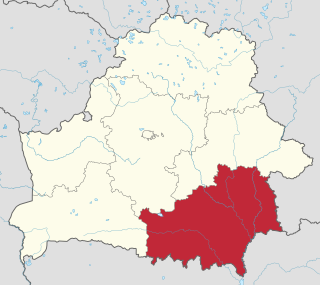
Gomel Region or Gomel Oblast or Homyel Voblasts is one of the regions of Belarus. Its administrative center is Gomel.

The Dnieper, Dnipro or Dnyapro is one of the major rivers of Europe, rising in the Valdai Hills near Smolensk, Russia, before flowing through Belarus and Ukraine to the Black Sea. It is the longest river of Ukraine and Belarus and the fourth-longest river in Europe, after the Volga, Danube, and Ural rivers. The total length is approximately 2,200 km (1,400 mi) with a drainage basin of 504,000 square kilometres (195,000 sq mi).

The Berezina or Biarezina is a river in Belarus and a right tributary of the Dnieper. The river starts in the Berezinsky Biosphere Reserve. The length of the Berezina is 613 km. The width of the river is 15-20 m, the maximum is 60 m. The banks are low, steep in some areas, sandy, and the floodplain is swampy. Berezina freezes usually in the 1st half of December.

Babruysk, Babrujsk or Bobruisk is a city in the Mogilev Region of eastern Belarus on the Berezina river. It is a large city in Belarus. As of 2009, its population was 215,092. The name Babrujsk probably originates from the Belarusian word babyor, many of which used to inhabit the Berezina. However, beavers in the area had been almost eliminated by the end of the 19th century due to hunting and pollution.
Bobr may refer to:

Mogilev Region or Mogilev Oblast or Mahilyow Voblasts, is a region (oblast) of Belarus with its administrative center at Mogilev (Mahilyow).

Barysaw or Borisov is a city in Belarus near the Berezina River in the Minsk Region 74 km north-east from Minsk. Its population is around 145,000.
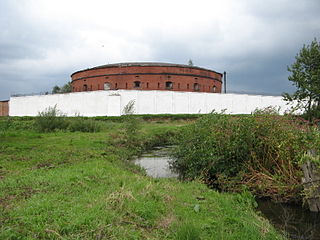
The Babruysk Fortress is a historic fortress in the city of Babruysk, Belarus that was built between 1810 and 1836. It is one of the best surviving examples of fortification architecture and design in the first half of the 19th century. The fortress was constructed in the historic center of the city, at the confluence of the Babruyka and Berezina rivers. It was one of the western Russian fortresses.

The 16th Army was a field army of the Red Army during the Russian Civil War era. It was originally formed as the Western Army on November 15, 1918, by the Russian SFSR for the purpose of recovering territories lost by the Russian Empire during the First World War and establishing Soviet republics in those territories. The Western Army engaged various local forces from the Baltic States, Belarus, Poland and Ukraine, and its actions contributed to starting the Polish–Soviet War of 1919–1920. The army fought in the Polish–Soviet War under the command of Nikolai Sollogub and advanced westwards into Poland in July 1920 before being thrown back during the Battle of Warsaw in August. The army retreated east into Belarus and was disbanded in May 1921.

The Svislach or Svislač, or Svisloch, is a river in Belarus, a right tributary of the river Berezina. It is 327 kilometres (203 mi) long, and has a drainage basin of 5,160 square kilometres (1,990 sq mi). The name is derived from the root -visl- 'flowing,' of Indo-European origin.
Svislach or Śvislač, is the administrative center of Svislach Raion, Grodno Voblast, Belarus.

Byerazino, or Berezino, also known as Biarezan, is a town on the Berezina River in Minsk Region of Belarus. The population is 11 832.

Asipovichy District is a raion (district) in Mogilev Region, Belarus, the administrative center is the town of Asipovichy. In 2009, its population was 52,447. The population of Asipovichy accounts for 62.0% of the district's population.
The First Battle of Berezina was a battle fought around the Berezina in the Polish-Soviet war. It ended with a Polish victory and the capture of 1000 Soviet prisoners.
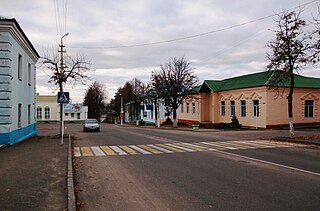
Dokshytsy is a town in the Vitebsk Region of Belarus with a significant Chassidic history. It is 200 km (124.27 mi) southwest of Vitebsk and a kilometer from the source of the Berezina River. Its population in 2010 was 6,600.

Dmowski's Line was a proposed border of Poland after World War I. It was proposed by the Polish delegation at the Paris Peace Conference of 1919 and it was named after Roman Dmowski, Polish foreign minister. Poland wanted Upper Silesia, Pomerelia including Danzig, Warmia and Masuria, all of Lithuania, and western parts of Belarus, Polesia, Volhynia and Podolia.
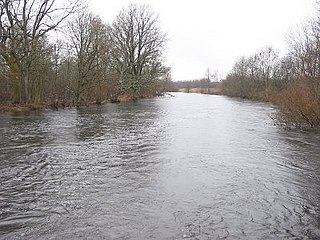
Western Berezina or simply Berezina is a river in Belarus, a right tributary of the river Neman.
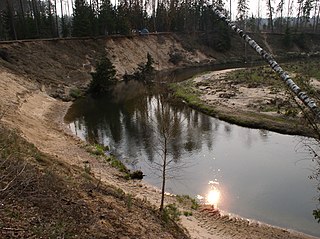
Islach is a river in Belarus, a right tributary of Western Berezina.
The Western Front was a front of the Red Army during the Russian Civil War and Polish-Soviet War, which existed between February 12, 1919 and April 8, 1924. The Western Front was first established on the basis of the administration of the disbanded Northern Front. The Front headquarters were located consequently in Staraya Russa, Molodechno, Dvinsk, Smolensk and Minsk.